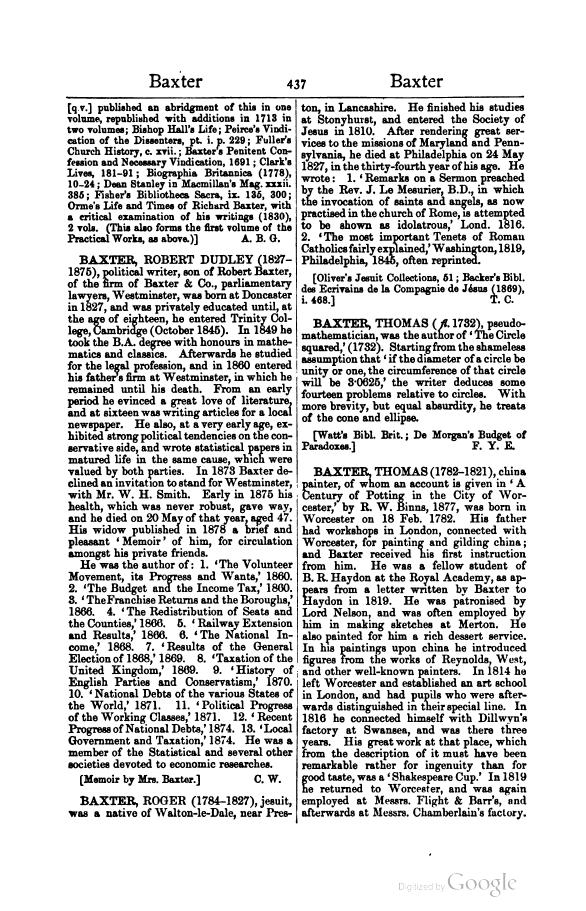BAXTER, ROBERT DUDLEY (1827–1875), political writer, son of Robert Baxter, of the firm of Baxter & Co., parliamentary lawyers, Westminster, was born at Doncaster in 1827, and was privately educated until, at the age of eighteen, he entered Trinity College, Cambridge (October 1845). In 1849 he took the B.A. degree with honours in mathematics and classics. Afterwards he studied for the legal profession, and in 1860 entered his father's firm at Westminster, in which he remained until his death. From an early period he evinced a great love of literature, and at sixteen was writing articles for a local newspaper. He also, at a very early age, exhibited strong political tendencies on the conservative side, and wrote statistical papers in matured life in the same cause, which were valued by both parties. In 1873 Baxter declined an invitation to stand for Westminster, with Mr. W. H. Smith. Early in 1875 his health, which was never robust, gave way, and he died on 20 May of that year, aged 47. His widow published in 1878 a brief and pleasant ‘Memoir’ of him, for circulation amongst his private friends.
He was the author of:
- ‘The Volunteer Movement, its Progress and Wants,’ 1860.
- ‘The Budget and the Income Tax,’ 1860.
- ‘The Franchise Returns and the Boroughs,’ 1866.
- ‘The Redistribution of Seats and the Counties,’ 1866.
- ‘Railway Extension and Results,’ 1866.
- ‘The National Income,’ 1868.
- ‘Results of the General Election of 1868,’ 1869.
- ‘Taxation of the United Kingdom,’ 1869.
- ‘History of English Parties and Conservatism,’ 1870.
- ‘National Debts of the various States of the World,’ 1871.
- ‘Political Progress of the Working Classes,’ 1871.
- ‘Recent Progress of National Debts,’ 1874.
- ‘Local Government and Taxation,’ 1874.
He was a member of the Statistical and several other societies devoted to economic researches.
[Memoir by Mrs. Baxter.]
BAXTER, ROGER (1784–1827), jesuit, was a native of Walton-le-Dale, near Preston, in Lancashire. He finished his studies at Stonyhurst, and entered the Society of Jesus in 1810. After rendering great services to the missions of Maryland and Pennsylvania, he died at Philadelphia on 24 May 1827, in the thirty-fourth year of his age. He wrote:
- ‘Remarks on a Sermon preached by the Rev. J. Le Mesurier, B.D., in which the invocation of saints and angels, as now practised in the church of Rome, is attempted to be shown as idolatrous,’ Lond. 1816.
- ‘The most important Tenets of Roman Catholics fairly explained,’ Washington, 1819, Philadelphia, 1845, often reprinted.
[Oliver's Jesuit Collections, 51; Backer's Bibl. des Ecrivains de la Compagnie de Jésus (1869), i. 468.]
BAXTER, THOMAS (fl. 1732), pseudo-mathematician, was the author of ‘The Circle squared,’ (1732). Starting from the shameless assumption that ‘if the diameter of a circle be unity or one, the circumference of that circle will be 3.0625,’ the writer deduces some fourteen problems relative to circles. With more brevity, but equal absurdity, he treats of the cone and ellipse.
[Watt's Bibl. Brit.; De Morgan's Budget of Paradoxes.]
BAXTER, THOMAS (1782–1821), china painter, of whom an account is given in ‘A Century of Potting in the City of Worcester,’ by R. W. Binns, 1877, was born in Worcester on 18 Feb. 1782. His father had workshops in London, connected with Worcester, for painting and gilding china; and Baxter received his first instruction from him. He was a fellow student of B. R. Haydon at the Royal Academy, as appears from a letter written by Baxter to Haydon in 1819. He was patronised by Lord Nelson, and was often employed by him in making sketches at Merton. He also painted for him a rich dessert service. In his paintings upon china he introduced figures from the works of Reynolds, West, and other well-known painters. In 1814 he left Worcester and established an art school in London, and had pupils who were afterwards distinguished in their special line. In 1816 he connected himself with Dillwyn's factory at Swansea, and was there three years. His great work at that place, which from the description of it must have been remarkable rather for ingenuity than for good taste, was a ‘Shakespeare Cup.’ In 1819 he returned to Worcester, and was again employed at Messrs. Flight & Barr's, and afterwards at Messrs. Chamberlain's factory.

